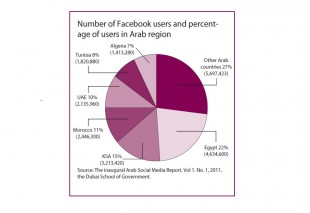

Anti-social restaurants?

If you aren’t embracing social media then you’re ignoring millions of potential diners
Social media might seem irrelevant to the hard world of business, but is “millions of Dirhams” irrelevant? That’s what you could be missing out on according to Mohamed Parham Al Awadi, co-founder of schwarma concept Wild Peeta:“Two years ago my brother Peyman and I were just two Emirati guys with another silly schwarma idea,” said Al Awadhi.
“Since we launched with our social media campaign we have gained 7,000 direct followers across Twitter and Facebook, and now have indirect access to thousands more followers through them.
“We have since been covered in the Financial Tmes, by the BBC, by CNN and countless websites. You can monetise that; that is millions of Dirhams worth of coverage,” said Al Awadhi.
Figures released by the Dubai School of Government (DSG) revealed that the total number of Facebook users in the Arab world rocketed by 78% last year, up to 21,361,863 in December 2010 from 11,978,300 in January 2010.
It is not only relevant to brands aimed at youngsters either: the DSG report showed that in the UAE young users (between the ages of 15 and 29) represent only 55% of all Facebook users, while in Qatar they represent 56% and 59% in Kuwait.
Stefan Breg, chief worrier of food and beverage creative agency Tribes, is adamant that the Middle Eastern F&B sector is not moving quickly enough to keep up with the way people are using social media today and is missing out on related revenue.
“There is a disconnect between the restaurant sector and the connectivity we get from Twitter and Facebook,” said Breg. “There is a huge opportunity for restaurants to enhance their communication with guests before, during and after dining. Technophobes may find it daunting but someone’s going to make a lot of money by using this technology to enhance the restaurant experience.”
GM of Le Méridien Al Aqah in Fujairah, Patrick Antaki, agrees that there is still a long way to go for social media and the F&B sector. “We definitely haven’t maximised utilisation yet,” he admitted.
While the hotel itself has a strong CRM programme which maintains a flow of email contact with guests before and after their stay, there is not yet a similar system tailored specifically to the F&B outlets: “There is still a way to go.
It’s definitely not reached its peak,” said Antaki, who added that he was looking to recruit a dedicated staff member for social media to meet this growing demand.
Al Awadhi is clear that social media is not something that should be viewed as just for the little guys: “It is definitely scaleable. The only thing that would stop a large company from embracing social media would have everything to do with that company’s bureaucracy and nothing to do with social media itself.”
However, although Zuma restaurant in Dubai International Financial Centre has a Facebook page, director of operations, Ajaz Shiekh, is dubious of its ability to generate revenue: “Do I think that social media brings me business? Maybe a percentage of it, but it is more of a communication channel,” he said. “Just having a Facebook page is not going to bring clients in, you have to have the concept and the food right to get people there in the first place.”
Social media is “not vital” in Shiekh’s opinion: “If you have a solid product then yes it is an amazing communication tool, but I don’t think the tool itself will bring you business.”
Penetration and uptake of Facebook in the Arab world: A snapshot
• The total number of Facebook users in the Arab world stands at 21,361,863 (Dec. 2010), up from 11,978,300 (Jan. 2010), a 78% annual growth rate.
• The UAE is the top Arab country in terms of Facebook penetration as a percentage of the population and it is also among the top 10 in the world, with a rate of 45%.
• GCC countries dominate the top five of the Arab world’s Facebook users as a percentage of the population, with Lebanon being the only exception.
• With around 4.7 million Facebook users, Egypt constitutes about 22% of total users in the Arab region.
• Youth (between the ages of 15 and 29) make up 75% of Facebook users across the whole Arab region.
• Gender breakdown of Facebook users indicates an average 2:1 ratio of male to female users in the Arab region, compared to almost 1:1 globally.
Source: Arab Social Media Report, Vol 1. No. 1, 2011, the Dubai School of Government.